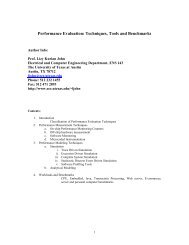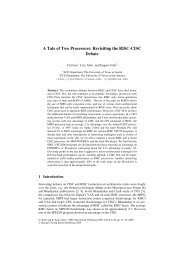Copyright by William Lloyd Bircher 2010 - The Laboratory for ...
Copyright by William Lloyd Bircher 2010 - The Laboratory for ...
Copyright by William Lloyd Bircher 2010 - The Laboratory for ...
You also want an ePaper? Increase the reach of your titles
YUMPU automatically turns print PDFs into web optimized ePapers that Google loves.
prefetch traffic does increase after the model failure, the total number of bus transactions<br />
does not. Since the number of bus transactions generated <strong>by</strong> each processor does not<br />
sufficiently predict memory power, an outside (non-CPU) agent is accessing the memory<br />
bus. For the target system the only other agent on the memory bus is the memory<br />
controller itself, per<strong>for</strong>ming DMA transactions on behalf of I/O devices.<br />
Bus Transactions/1K Cycles<br />
30<br />
25<br />
20<br />
15<br />
Cache-Miss model error grows as<br />
memory traffic becomes dominated<br />
<strong>by</strong> prefetch<br />
Figure 5.4 Prefetch and Non-Prefetch Bus Transactions – mcf<br />
Changing the model to include memory accesses generated <strong>by</strong> the microprocessors and<br />
DMA events resulted in a model that remains valid <strong>for</strong> all observed bus utilization rates.<br />
It should be noted that using only the number of read/write accesses to the DRAM does<br />
not directly account <strong>for</strong> power consumed when the DRAM is in the precharge state.<br />
DRAM in the precharge state consumes more power than in idle/disabled state, but less<br />
than in the active state. During the precharge state, data held in the sense amplifiers is<br />
committed to the DRAM array. Since the initiation of a precharge event is not directly<br />
controlled <strong>by</strong> read/write accesses, precharge power cannot be directly attributed to<br />
75<br />
100%<br />
50%<br />
10<br />
5<br />
Non-Prefetch<br />
Prefetch<br />
-50%<br />
0<br />
Error<br />
-100%<br />
0 50 100<br />
Seconds<br />
150 200<br />
0%<br />
Error(%)




